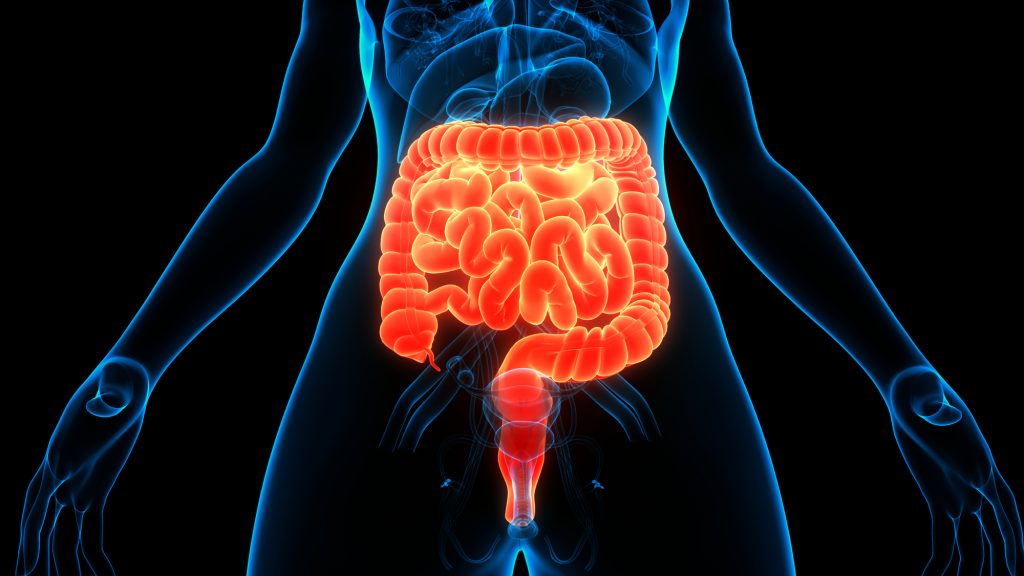The answer to a healthy gut may lie in having a healthy endocannabinoid system. Endocannabinoids are endogenously produced ligands that act on cannabinoid, vanilloid, and peroxisome proliferator-activated receptors. The two primary endocannabinoids are anandamide and 2-arachidonoylglycerol. Endocannabinoids, their receptors, enzymes, and downstream signaling targets make up the endocannabinoid system. Exogenous cannabinoids such as cannabidiol (CBD) oil also act on this system. More and more research suggests the endocannabinoid system has an important role to play in intestinal health.
Interactions Between the Endocannabinoid System and the Gut
An abundance of evidence indicates there is intriguing interplay between the endocannabinoid system and the gut. High levels of the endocannabinoids anandamide and 2-arachidonoylglycerol are observed in the colon.1 The fatty acid amide hydrolase (FAAH) the enzyme, which degrades anandamide, is also very active in the colon.1
The endocannabinoid system assists with the regulation of various gastrointestinal functions. It is involved with gut motility,2 indicating it regulates constipation and diarrhea. Intestinal permeability is also regulated by the endocannabinoid system.3 Depending on the action which endocannabinoids exert on the intestinal mucosa, they can influence various aspects of permeability.3 For example, the endocannabinoid anandamide is considered a “gate opener” while palmitoylethanolamide (PEA), a fatty acid amide that belongs to the same family of compounds as anandamide, is a “gatekeeper.”3 This suggests that cannabinoids can support the health of people with leaky gut.
Cross Talk Between the Gut Microbiota and the Endocannabinoid System
One of the most interesting facets of the endocannabinoid system is its interactions with the gut microbiota. Muccioli and colleagues were the first to show that the gut microbiota can influence intestinal endocannabinoid tone.4 These same researchers found that microbiota associated with obesity correlates with higher intestinal level of anandamide, leading to increased gut permeability.4 Furthermore, daily administration of the bacterium Akkermansia muciniphila to obese and type 2 diabetic mice reversed diet‐induced obesity via a mechanism linked to higher gastrointestinal levels of endocannabinoids that control inflammation, the gut barrier, and gut peptide synthesis.5
Other studies indicate that the endocannabinoid system in adipose tissue modulates gut microbiota composition. In fat tissue, selective deletion of an enzyme that synthesizes endocannabinoids leads to obesity, glucose intolerance, impaired lipid metabolism, and adipose tissue inflammation.6 These metabolic changes correlated with a shift in gut microbiota composition.
Further evidence indicates the endocannabinoid system may be involved in the beneficial effects of probiotics on the colon. Administration of Lactobacillus to rodents improved visceral pain and stimulated CB2 receptors in the intestinal epithelium.7 When CB2 activity was blocked; the probiotics were unable to relieve the pain. Other evidence supporting the relationship between the gut microbiota and the endocannabinoid system is that antibiotic-induced dysbiosis of the gut microbiota is associated with inflammation and alterations in the endocannabinoid system in the guts of rodents.8 Adding to this evidence is that interestingly, resveratrol is known to support healthy levels of inflammation in the gut by ameliorating gastrointestinal microbiota dysbiosis, and it accomplishes this through modulation of the endocannabinoid system.9
Supporting a Healthy Gut Inflammatory Response
The endocannabinoid system is known to assist in blocking excessive inflammatory response in the gut. Researchers have observed that reducing anandamide through inhibiting FAAH stopped the development of colitis.10 Furthermore, polymorphisms in the gene encoding CB1 correlate with some forms of irritable bowel syndrome (IBS).11 Also, the cannabinoid CBD inhibits the generation of inflammatory cytokines in preclinical models, thereby ameliorating intestinal inflammation.12,13
Given these findings, it is logical that exogenous cannabinoids such as CBD may play a role in supporting a healthy inflammatory response in people. In intestinal biopsies from individuals with ulcerative colitis, increased glial cell activation and intestinal damage were observed both during active inflammation and in remission.13 CBD reduced the expression of inflammatory proteins and reduced enteric reactive gliosis in the human colonic biopsies.13
In a randomized, placebo-controlled study, although the primary endpoint of the percentage of patients in remission after treatment was similar between the CBD-rich botanical extract and placebo, other improvements in the CBD group were noted.14 For example, total and partial Mayo scores for ulcerative colitis improved after using the CBD-rich botanical extract. In people taking the CBD-rich extract, there were also improvements in physician’s global assessment of illness severity, global impression of change, and patient-reported quality-of-life. Adverse effects were mild to moderate and were thought to have occurred because this extract did contain a low amount of THC. It was notable that the people in the placebo group suffered from more gastrointestinal-related adverse effects compared with the CBD group, which were an indication that the ulcerative colitis was worsening.
Conclusion
The endocannabinoid system regulates intestinal health by controlling inflammatory responses, gut motility, and intestinal permeability. The cannabinoid CBD may play a role in balancing this system and supporting gut health.
References:
- Hornby PJ, Prouty SM. Involvement of cannabinoid receptors in gut motility and visceral perception. Br J Pharmacol. 2004 Apr;141(8):1335-45.
- Izzo AA, Piscitelli F, Capasso R, et al. Peripheral endocannabinoid dysregulation in obesity: relation to intestinal motility and energy processing induced by food deprivation and re-feeding. Br J Pharmacol. 2009 Sep;158(2):451-61.
- Cani PD, Plovier H, Van Hul M, et al. Endocannabinoids–at the crossroads between the gut microbiota and host metabolism. Nat Rev Endocrinol. 2016 Mar;12(3):133-43.
- Muccioli GG, Naslain D, Bäckhed F, et al. The endocannabinoid system links gut microbiota to adipogenesis. Mol Syst Biol. 2010 Jul;6:392.
- Everard A, Belzer C, Geurts L, et al. Cross-talk between Akkermansia muciniphila and intestinal epithelium controls diet-induced obesity. Proc Natl Acad Sci U S A. 2013 May 28;110(22):9066-71.
- Geurts L, Everard A, Van Hul M, et al. Adipose tissue NAPE-PLD controls fat mass development by altering the browning process and gut microbiota. Nat Commun. 2015 Mar 11;6:6495.
- Rousseaux C, Thuru X, Gelot A, et al. Lactobacillus acidophilus modulates intestinal pain and induces opioid and cannabinoid receptors. Nat Med.2007 Jan;13(1):35-7.
- Guida F, Turco F, Iannotta M, et al. Antibiotic-induced microbiota perturbation causes gut endocannabinoidome changes, hippocampal neuroglial reorganization and depression in mice. Brain Behav Immun. 2018 Jan;67:230-45.
- Chen M, Hou P, Zhou M, et al. Resveratrol attenuates high-fat diet-induced non-alcoholic steatohepatitis by maintaining gut barrier integrity and inhibiting gut inflammation through regulation of the endocannabinoid system. Clin Nutr. 2019 May 30. pii: S0261-5614(19)30231-6. [Epub ahead of print.]
- Wisniewski PJ, Dowden RA, Campbell SC. Role of Dietary Lipids in Modulating Inflammation through the Gut Microbiota. 2019 Jan;11(1):117.
- Sharkey KA, Wiley JW. The Role of theEndocannabinoid System in the Brain-Gut Gastroenterology. 2016 Aug;151(2):252-66.
- Borrelli F,Aviello G, Romano B, et al. Cannabidiol, a safe and non-psychotropic ingredient of the marijuana plant Cannabis sativa, is protective in a murine model of colitis. J Mol Med (Berl). 2009 Nov;87(11):1111-21.
- De Filippis D, Esposito G, Cirillo C, et al. Cannabidiol reduces intestinal inflammation through the control of neuroimmune axis. PLoS One.2011;6(12):e28159.
- Irving PM, Iqbal T, Nwokolo C, et al. A Randomized, Double-blind, Placebo-controlled, Parallel-group, Pilot Study of Cannabidiol-rich Botanical Extract in the Symptomatic Treatment of Ulcerative Colitis. Inflamm Bowel Dis. 2018 Mar 19;24(4):714-24.







